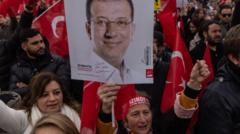Ekrem Imamoglu, the Istanbul Mayor and a critical challenger to President Erdogan, appeared in court for the first time since his arrest on corruption and terrorism charges. His detention has ignited the largest anti-Erdogan protests in years, with opposition claiming political motivations behind the charges. Despite the government's denial of interference, the situation raises questions about judicial independence in Turkey.
Imamoglu's First Court Appearance Sparks Nationwide Protests Against Erdogan

Imamoglu's First Court Appearance Sparks Nationwide Protests Against Erdogan
Istanbul Mayor Ekrem Imamoglu faces corruption charges as supporters rally against his arrest, seen as politically motivated.
Istanbul Mayor Ekrem Imamoglu, a significant contender against President Recep Tayyip Erdogan, made his initial court appearance following his recent arrest, which placed him in a high-security facility. The charges against him include corruption and terrorism, yet he was in court for a separate case concerning accusations of attempting to intimidate Istanbul's chief prosecutor, Akin Gurlek. The opposition has labeled his arrest a "coup attempt against our next president," sparking widespread protests against Erdogan's administration—the largest seen in over a decade.
Imamoglu addressed the court, declaring, "I am here because I won elections three times in Istanbul," emphasizing the political dimensions of his detention, as he noted the power struggle for control over Turkey through Istanbul. Crowds of supporters gathered outside the Silivri jail complex, viewing his detention as politically motivated, drawing attention from the international community. The Council of Europe’s parliamentary assembly has urged Turkish officials to retract charges against Imamoglu and secure his release.
Despite asserting judicial independence, the Turkish government faces heavy criticism for its approach to governance and treatment of dissent. Imamoglu's wife Dilek and their child, alongside various MPs, attended the hearing, showing solidarity amid growing protests where nearly 2,000 people were reportedly arrested. Imamoglu criticized state media for disseminating misleading information during the proceedings, arguing that media censorship threatens democratic values.
Meanwhile, amid ongoing demonstrations that have resulted in numerous arrests, opposition parties express concerns over the government’s efforts to silence dissenting voices ahead of the national elections expected in 2028. Should Erdogan seek re-election, the legitimacy of the current judicial processes will undoubtedly remain a point of contention in the volatile political landscape of Turkey.



















